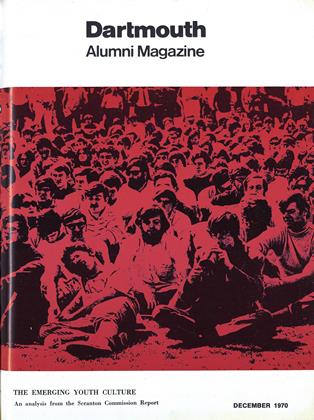Dartmouth College asks: "How can white men help red men?" Sylvester M. Morey "18 asks the question differently. He has edited Can the Red Man Help the White Man? Published by Gilbert Church, New York, this paperback (116 pp., $1.95) is based on a week-long Denver conference in which Indian leaders met with Mr. Morey, Chairman of the Myrin Institute, Inc., a nonprofit foundation organized to promote adult education, and Dr. Franz E. Winkler, President of Myrin. Red men told white men about the importance of intuitive wisdom based on the passionate love of mountains and plains, forests and rivers. Stressed also were tribal legends orally transmitted about campfires from generation to generation, the role of ceremonial dances, and the deference paid to Indian elders.
With a grim look on his face Uncle Sam is pointing his finger at you or your son, and your forehead puckers with worry about your ignorance of the draft law. For just a dollar you may pick up enough solid information to end your discomfort. TheDraft Law (Barnes & Noble, 86 pp.), written by J. William Heckman Jr. '66 and John Griffiths, will answer almost any basic question you may ask about the draft and the operation of the Random Selection System ("the lottery"). The book serves as a general introduction to the scope and function of the Selective System and specifically to the Military Selective Service Act of 1967 as amended. With such help, the services of an outside professional will hardly be needed if your questions are like these: Who is liable to the draft? What are the classifications? What is non-combatant service? In what regulations can be found the Standards of Medical Fitness for Induction? What official changes have affected the status of various deferments? How does the lottery system work and what are one's chances in being called? Is one subject to prosecution for failure to perform a duty imposed by the Act? If one has an illegitimate child, can he count on deferment?
Professor of Philosophy in King's College, Aberdeen, and later of Moral Philosophy at Glasgow succeeding Adam Smith, Thomas Reid (1716-1796) attempted to free philosophy from skepticism and to base it on the principles of intuitive or a priori reasoning. Known as the leading representative of the School of Common Sense, he opposed the irrationalities of Hume's skepticism and Berkeley's idealism, which had dominated philosophical thinking since Descartes. Reid's An Inquiry into the Human Mind onthe Principles of Common Sense, long out of print, is now available in a publication by the Chicago University Press (279 pp., $13.50), edited with an introduction of 44 pages by Timothy J. Duggan, Professor of Philosophy at Dartmouth, who places Reid in his historical context and links him with modern scholarship.
The son of Eugen Rosenstock-Huessy, Dartmouth Professor of Social Philosophy and Professor of Law, Emeritus, Dr. Hans R. Huessy '42 has edited Mental Health withLimited Resources: Yankee Ingenuity inLow-Cost Programs and contributed an introduction and four essays: "Middlebury College Mental Health Program," "The General Practitioners Contribution to After-Care," "Mental Health Consultation in Varied Settings," and "Exciting Possibilities for Secondary Prevention." The volume concentrates on what can be done in Vermont about the paucity of mental health resources, particularly in rural areas, and describes the pioneering efforts of a small number of professionals collaborating with non-professionals and sub-professionals in assisting mentally disturbed persons in a variety of backgrounds. In an era when all mental health programs are experiencing tremendous pressures for expansion, the book attempts to bring together for rural areas possible patterns of service which can be implemented without a large number of unavailable highly trained individuals. With Dr. Huessy as adviser and coordinator, chapters are written by twelve persons individually involved. Published in New York by Grune & Stratton, the volume of 124 pages costs $5.50.
 View Full Issue
View Full Issue
More From This Issue
-
 Feature
FeatureThe New Youth Culture
December 1970 -
 Feature
FeatureThe Outward Bound Term
December 1970 By Robert B. Graham Jr. '40 -
 Feature
FeatureTrustees Reenact 1770 Board Meeting
December 1970 -
 Article
ArticleBig Green Teams
December 1970 -
 Article
ArticleFaculty
December 1970 By WILLIAM R. MEYER -
 Article
ArticleThe Undergraduate Chair
December 1970 By CHRISTOPHER CROSBY '71
J.H.
Books
-
 Books
BooksThe Best One-act Plays
October 1935 -
 Books
BooksGROWTH HORMONES IN PLANTS
November 1936 By Charles J. Lyon -
 Books
BooksHE WILL SPEAK PEACE
June 1947 By Dilys Bennett Laing -
 Books
BooksAMATEURS AT WAR
June 1943 By H. F. West -
 Books
BooksSOVIET MILITARY LAW AND ADMINISTRATION.
July 1955 By H. GORDON SKILLING -
 Books
BooksTHE CASE FOR PEACE.
January 1956 By RICHARD W. STERLING








